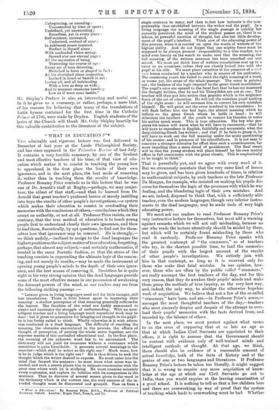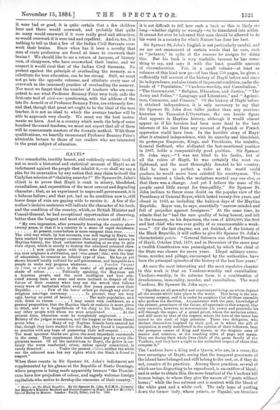"WHAT IS EDUCATION ?"* Tills admirable and vigorous lecture was
first delivered in December of last year at the Leeds Philosophical Society, and has since appeared in the Princeton Review of last July. It contains a very forcible summary, by one of the liveliest and most effective teachers of his time, of that view of edu- -cation which makes it to consist in teaching the young how to apprehend in the first place the limits of their own ignorance, and in the next place, the best mode of removing it, rather than in teaching them the results of knowledge. Professor Bonamy Price reminds us in this lecture that he was one of Dr. Arnold's staff at Rugby,—perhaps, we may conjec- ture, the ablest of that staff,—and that he learned from Dr. Arnold that great teacher's profound horror of merely instilling into boys the results of other people's investigations,—a system which makes their education to consist in overloading their memories with the conclusions of others,—conclusions which they accept on authority, or not at all. Professor Price insists, on the contrary, that the true method of education is to teach young people first to understand clearly their own ignorance, and then to lead them, Socratically, by apt questions, to find out for them- selves how that ignorance may be removed. He is strongly,— we think unduly,—inclined to assign to the dead languages the highest position as the subject-matter of true education, forgetting, perhaps, that almost any subject,—and certainly mathematics, if treated in the same Socratic fashion, so that the stress of the teaching consists in expounding the ultimate logic of the reason- ing, and not merely its results,—may be made the instrument of opening young people's minds to the depth of their own ignor- .ance, and the best means of removing it. Doubtless he is quite right in his very strong opinion that the dead languages provide some of the most effective means in our possession of awakening the dormant powers of the mind, as our readers may see from the following striking passage :—
"Lessons given in living languages need call for little thought, still less translations. There is little labour spent in mastering their meaning : a shallow perception of that meaning generally suffices for the learner. The faculties of the mind are feebly summoned to awake and encounter the struggle of understanding. With an unin- telligent teacher and a living language much superficial work may be done : but it gives no guarantee for bringing-out thought in the pupil : he is but feebly called to think. Wholly otherwise is it with educa- tion conducted in a dead language. The difficulty of reaching the meaning, the obstacles encountered in the process, the efforts of thought, of perception, of patting the whole sense together, are the supreme merits of this unrivalled educational tool. In the first place, the meaning of the unknown word has to be ascertained. The dictionary will not yield its treasures without a resistance which sometimes is quite formidable. It presents several meanings to the searcher—which shall he select as the right one ? Much more, how is he to judge which is the right one ? He is thus driven to seek the thought which the writer desired to express. He must enter into the mind that framed the sentence : he must learn what sense was in- tended, and such a search places him in intimate communion with the great man whose work he is studying. He must examine minutely every expression, and explore its relation with its companions in the sentence. Thus to discover of several senses given to the word in the dictionary which is the correct one, the very essence of the in- tended thought must be discovered and grasped. Pass on from a
• What is Education? By Bonamy Price, D.C.L., Professor of Political Economy, Oxford. Loudon : Kogan Paul, Trench. and Co.
single sentence to many, and then redect how intimate is the com- panionship thus established between the writer and the pupil. In a living language the meaning of the single passage is quickly but cursorily perceived, the mind of the student passes on, there is no labour, no powerful exertion of thought, but also but little develop- ment of the pupil's intellect. Think now of the educating power of this process, when it is carried on upon the words of writers of the highest ability. And do not forget that one mighty force must be supposed to be always present : responsibility to a true teacher, to a mind ever keenly on the watch to make sure that the meaning, the full meaning, of the written sentence has been searched out and seized. We must not think here of written translations sent up to a tutor or an examiner, unless they are closely looked into with the pupil at his side. We must place ourselves in the presence of a Diva, voce lesson conducted by a teacher who is master of his profession. The construing youth has failed to catch the right meaning of a word, or worse yet, the sense of the whole passage. The error is pointed out ; the badness of the logic imputed to the great Greek is exhibited. The pupil's eyes are opened to the fatal fact that he has not mastered the thought written, that he and his Thuoydides are not at one. The teacher will then put into action that practice which is the mightiest force of the art of education. He will tell the mistaken pupil nothing of the right sense : he will summon him to correct his own mistakes himself. He will point out the error involved in his translation : he will flash before him the bad logic, the absurd meaning which he inflicts on the great Greek whom he holds in hand : he will stimulate the intellect of the youth to correct his blunder, to make his author speak sense. This is true education. The boy who pre- pares his lesson will know what he will have to encounter,—that he will-have to reproduce in English, faithfully and accurately, what the deep-thinking Greek has written ; and that if he fails to grasp it, he will have to work out the full meaning under the acute questioning of his master, and in presence of his schoolfellows. It is not easy to conceive a stronger stimulus for effort than snot' a consciousness, far more impelling than a mere dread of punishment. The final result will be that the young student will place himself by his own mental effort in full communion with the great classic. This is emphatically to be taught to think."
That is powerfully put, and we agree with every word of it. But we strenuously maintain that the very same kind of lesson may be given, and has been given hundreds of times, in relation to mathematical subjects, by such teachers as the late Professor De Morgan, for example, who insisted on making his pupils dis- cover for themselves the logic of the processes with which he was dealing, and the blundering logic of their own mistakes. And we are, indeed, disposed to think that, with a sufficiently able teacher, even the modern languages, though very inferior instru- ments to the dead languages, may be made tools of very high educating power.
We must ask our readers to read Professor Bonamy Price's very instructive lecture for themselves, but must add a warning against remarks which we will not call misleading, because no one who reads the lecture attentively should be misled by them, but which will be certainly found misleading by those who read it carelessly. Professor Bonamy Price speaks with the greatest contempt of "the crammers," as of teachers who try, in the shortest possible time, to load the memories of their pupils with the largest amount of the results of other people's investigations. We entirely join with him in that contempt, so long as it is reserved only for those who make that fatal mistake. In our opinion, how- ever, those who are often by the public called " crammers," are really amongst the best teachers of the day, and for this very reason, that they do awaken their pupils' minds and make
them grasp the methods of true inquiry, as the very best way-, and, indeed, the only way, to abridge the otherwise hopeless
work of acquisition. We believe that not a few of the so-called " crammers " have been, and are,—in Professor Price's sense,— amongst the most thoughtful teachers of the day,—teachers who most sincerely despise and despair of the attempt to over- load their pupils' memories with the facts derived from, and. recorded by, the labours of others.
In the next place, we must protest against what seems to us the error of supposing that at so late an age as that at which Indian Civil Servants are appointed to their offices, it is right to assume that the Government should be content with evidence only of well-trained minds and intelligent methods of thought. At that age, we think, there should also be evidence of a reasonable amount of actual knowledge, both of the facts of history and of the genius of one or two languages and literatures. If Professor Bonamy Price's lecture be taken too literally, it might suggest that it is wrong to require any more acquisition of know- ledge at the age at which our Civil Servants go out to India, than you would require at the leaving examination of a good school. It is nothing to tell us that a few children here and there are overworking, by way of proof that the system of teaching which leads to overworking must be bad. Whether it were bad or good, it is quite certain that a few children here and there would overwork, and probably that quite as many would overwork if it were really good and attractive, as would overwork if it were bad and repellent. And so, too, it is nothing to tell us that a few of the Indian Civil Servants over- work their brains. Since when has it been a novelty that men of every profession are found at times to overwork their brains ? We should like to see a return of lawyers, of literary men, of clergymen, who have overworked their brains, and we suspect it would rival that of the Indian Civil Servants. No protest against the principle of overloading the memory, as a substitute for true education, can be too strong. Still, we must not go into the opposite extreme, and attribute every case of overwork to the (assumed) practice of overloading the memory. Nor must we forget that the number of teachers who are com- petent to use what Professor Bonamy Price very truly calls the first-rate tool of vivd-voce questioning, with the address of the late Dr. Arnold or of Professor Bonamy Price, are extremely few; and that, though that great art onght to be the ideal of the true teacher, it is not an ideal to which the average teacher will be able to approach very closely. We must use the best instru- ments we have. And in a country which needs the help of some hundred thousand teachers, we must not expect that all of them -will be consummate masters of the Socratic method. With these qualifications, we heartily recommend Professor Bonamy Price's admirable lecture to those of our readers who are interested in the great subject of education.



































 Previous page
Previous page